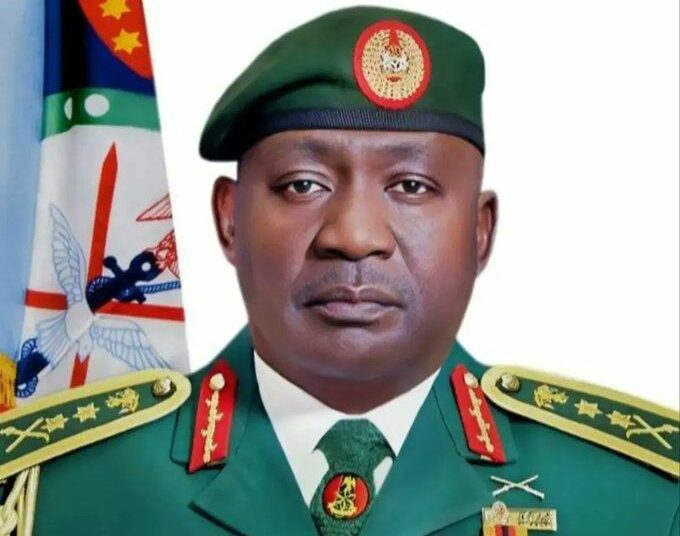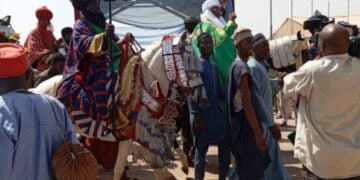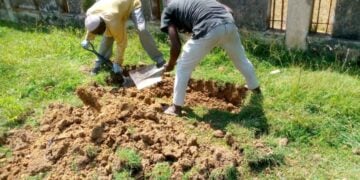The Chief of Defence Staff (CDS), General Christopher Musa, has revealed that the Department of State Services (DSS) and the National Intelligence Agency (NIA) are tracking politicians behind the country’s insurgency.
According to the CDS, they are also tracking terrorism financiers, and several prosecutions are already ongoing.
General Musa, who spoke during an exclusive interview on Channels TV’s Politics Today, also said that the nation’s weak legal system continues to stall justice and embolden criminal networks.
The CDS provided rare insight into the military’s operations, intelligence efforts, and the critical challenges facing Nigeria’s counterterrorism campaign.
“The process of naming and prosecuting terror financiers is ongoing. The Attorney General, DSS, NIA, and other agencies are working around the clock. Some of these sponsors have international connections, so it requires time and legal precision,” he said.
General Musa also lamented that the military often risks lives to apprehend high-value targets, only for them to be freed due to technicalities in court.
“You risk your life, arrest a terror suspect, and hand them over. Then they are released due to legal loopholes. It is demoralising,” he stated.
He called for establishing special courts or tribunals to handle terrorism cases swiftly. He urged lawmakers to reform the legal framework, which he described as “too soft” for the nature of the country’s threats.
“We need laws that send a clear message. In other countries, once you’re linked to terrorism, it is over for you. Here, we treat it with kid gloves.”
The Defence Chief also painted a grim picture of the regional security landscape, pointing to the collapse of Libya and the chaos in Sudan as key triggers for the influx of arms and fighters into Nigeria.
“Our problems began when Libya fell. Today, you can walk into an open market in parts of the Sahel and buy any weapon you want, not even on the black market,” he said.
With over 4,000 kilometres of porous borders, Musa stressed the need for enhanced border control and regional cooperation, especially with military juntas in neighbouring Sahel states like Mali, Burkina Faso, and Niger.
General Musa also warned of the increasing politicisation of insecurity. He suggested that some politicians may indirectly sponsor violence to discredit the government before elections.
“You notice the spike in violence recently? Last year had the fewest number of deaths. But now, as elections approach, attacks have increased. It’s no coincidence,” he said.
He confirmed that agencies like the DSS and NIA are investigating politicians linked to terror financing, adding that political ambitions should never be prioritised over national security.
“How do you want to govern a people you’re helping to destroy?” he asked.
Reacting to the recent killing of worshippers in Mosques in Borno State, the CDS emphasised that these groups have no regard for human life, religion, or borders. “They kill Christians, they kill Muslims. These are deranged individuals driven by a sick ideology. If you are not with them, you are the enemy,” he said.
He urged Nigerians to stop shielding or aiding terrorists, revealing that many insurgents rely on local enablers who provide fuel, logistics, phones, and hideouts.
“If we close off their support network, they will not survive. Everyone must take a stand. This war cannot be won by the military alone.”
Despite the ongoing threats, Gen. Musa maintained that significant progress is being made, pointing to the recent arrest of top Asaro commanders as a substantial win for military intelligence.
“We have been hunting those two for years. Their arrest shows how well intelligence and operations are now working together. Synergy among all forces is improving results.”
He praised frontline troops for their sacrifices and urged Nigerians to appreciate the men and women in uniform who, despite harsh conditions, continue to secure the nation.
“These are the few good men who stand in the rain and sun so we can sleep. Their sacrifice is enormous. And we must never take it for granted.”
He further lamented that insurgents often move quickly based on leaked information, making a timely response difficult, emphasising that drone use is expensive and inefficient without accurate intelligence; each strike can cost up to 100,000 dollars.
According to him, Nigeria’s surveillance capacity is also hampered by limited access to satellite technology, as current satellites are either inactive or controlled by foreign countries like China.
He said Nigeria’s strategic shift toward local defence manufacturing, following the passage of the Defence Industrial Bill, was to reduce dependency on foreign equipment.
According to him, this move is expected to reduce costs, create jobs, conserve foreign exchange, and enable exports to neighbouring countries.
On internal security, he proposed building fortified walls in critical areas of the Northeast to prevent insurgent movement, combined with drone surveillance and cameras.
He also advocated for a national database, suggesting that Nigeria needs a single digital ID system, similar to a social security number, to monitor citizens, vehicles, and assets.





